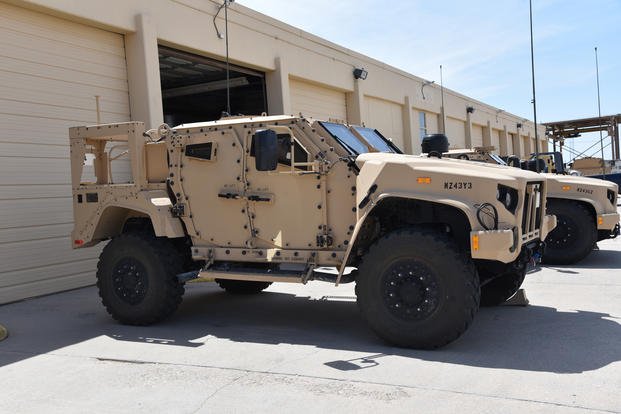The U.S. Army is slowing down its timeline to acquire a fleet of Joint Light Tactical Vehicles, an armored Humvee replacement that some have criticized as being better suited to past wars.
The Army's $178 billion proposed budget for fiscal 2021 earmarks $894.4 million to buy "1,920 JLTVs of various configurations as well as 1,334 JLTV-T companion trailers," according to a Feb. 10 Army statement.
"They are reductions; they are not cuts," Maj. Gen. Paul Chamberlain, director of Army budget, told reporters at the Pentagon. "We are extending the production life for JLTV."
The Army began slowing its JLTV acquisition strategy last year, announcing it would buy 2,530 JLTVs in fiscal 2020, a significant reduction from its 2019 purchase of 3,393 vehicles.
The JLTV was one of 93 programs the Army cut or reduced last year, putting roughly $30 billion in savings toward the Army's ambitious modernization effort.
Last April, then-Secretary of the Army Mark Esper said that the JLTV was essentially designed to fight a war with the kind of improvised explosive device (IED) threats that existed in Iraq.
Related: Army's Brand-New Combat Vehicle Was Designed for the Last War, Esper Says
The JLTV became a modernization priority for the Army and Marine Corps in the early days of Iraq, after the Humvee proved unable to protect troops from deadly IEDs.
Army leaders said last year that the service was considering lowering its procurement objective of buying 49,000 JLTVs by the mid-2030s.
Now Army budget officials say that the service has extended JLTV’s production life until 2041.
"The total number remains the same; it's just over a longer period that it is going to be procured," Chamberlain said.
Oshkosh Corp. was selected in August 2015 over Lockheed Martin Corp. and AM General LLC to build the JLTV, but Army budget officials said Tuesday that the service may award another competitive JLTV contract in 2022 to get a better deal.
"Normally, we do that to drive price down on the end-state, so if you have competition in the production space, you will eventually get some savings out of it," John Daniels, deputy assistant secretary of the Army for Plans, Programs and Resources, told reporters at the Pentagon.
-- Matthew Cox can be reached at matthew.cox@military.com.













